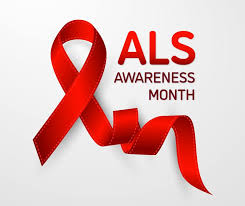- Home
- About
- Benefits & Services
- State Veterans Homes
- Nevada Veterans Memorial Cemeteries
- Community
- News
- Suicide Prevention
- Opioid Prevention
- Donate
- Fallen Heroes
- Nevada’s Veterans Memorials
- Calendar/Events
- Nevada Transition Assistance Program (NVTAP)
By Lisa Maciel, MPH
Deputy Director of Benefits
The month of May is ALS Awareness month. Individuals who have served in the military have a higher rate of ALS than the general public!
ALS, or Amyotrophic lateral sclerosis, is a fatal type of motor neuron disease, characterized by progressive degeneration of nerve cells in the spinal cord and brain. It’s often called Lou Gehrig’s disease, after a famous baseball player who died from the disease. (Johns Hopkins Medicine, 2024).
According to the Mayo Clinic, symptoms of ALS vary from one person to another and depend on which nerve cells are affected. However, it typically begins with muscle weakness that spreads and worsens as time goes on. Symptoms may include trouble walking, or maybe even weakness or twitching in the lower extremities, tripping, or falling. The upper extremities may also be weak and/or twitching. A person’s speech may be slurred, or they may have difficulty swallowing. There may also be other changes affecting thinking and/or behavior, such as crying or laughing at inappropriate times. (Mayo Clinic, 2024).
Before diagnosis, an individual may have symptoms of ALS for approximately 11 months before a diagnosis. On November 4th, 2009, the Department of Veterans Affairs (VA) established a presumption of service connection ALS for any veteran who is diagnosed with the condition after separation from military service, if they meet certain eligibility requirements. However, many veterans, and their family members, are unaware of this benefit. Veterans who meet the eligibility requirements will be granted a service-connected disability rating of 100%. Additionally, special monthly compensation (an additional payment to the regular compensation) may be granted (aid and attendance for example).
To be eligible for ALS to be granted as a service-connected disability, the veteran must have served at least 90 continuous days of active duty, diagnosed with ALS after separation from service. If a discharge was not characterized as under honorable conditions, benefits are not payable unless VA determines the discharge was “under conditions other than dishonorable.” However, in some cases, a veteran may qualify for medical care only, and a Veterans Service Officer (VSO) may also be able to assist you with filing for a discharge upgrade review through the veteran’s applicable branch of service.
All veterans and surviving dependents are encouraged to contact a VSO to see what benefits the veteran may be eligible for, or to see if dependent survivors may be entitled to, such as Dependency and Indemnity Compensation (DIC).
